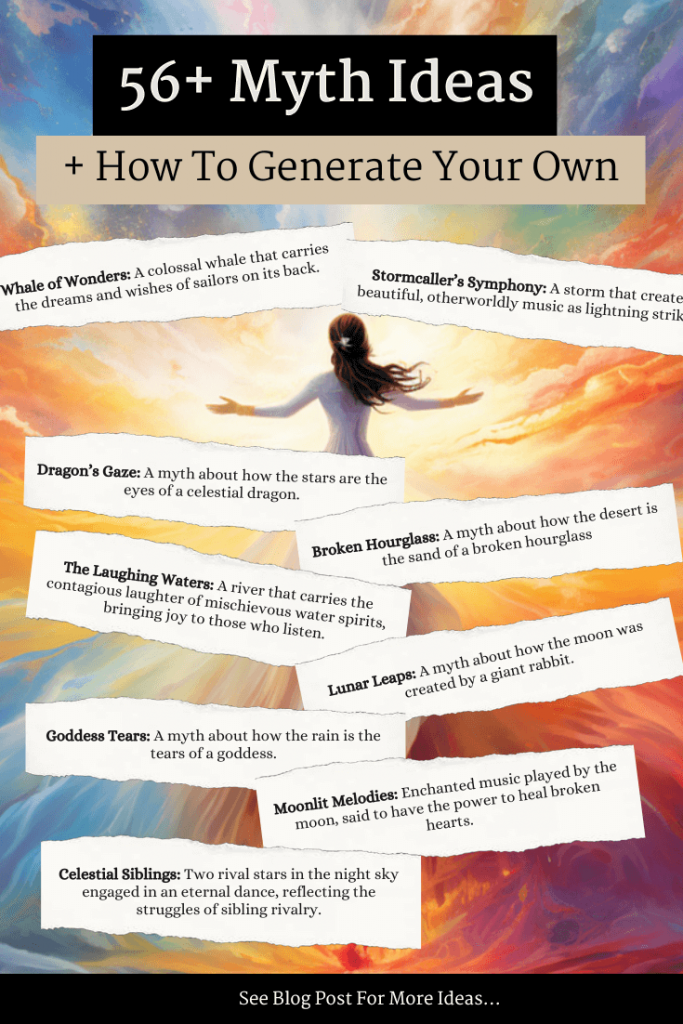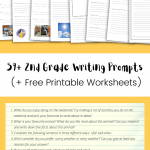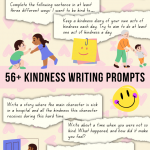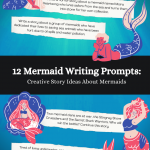56+ Myth Ideas (+ How To Generate Your Own)
Do you love myths? Do you want to create your own myth ideas for stories, games or fun? If you answered yes, then this blog post is for you! From dragons and fairies to gods and magic lands, there are loads of brilliant stories waiting to be told if you let your creativity run wild. In this post, we will share with you 56+ myth ideas that you can use or modify as you like. We’ll also show you how to generate your own myth ideas using some simple steps. So, let’s get started!
How to Come Up With A Myth Idea
One of the most fun and creative aspects of writing a myth is coming up with your own myth idea. A myth is a story that explains some aspect of the world, such as the origin of life, the nature of the gods, or the fate of the dead. Myths can be inspired by real-world cultures, religions, and legends, or they can be entirely original and unique. Here are 10 tips for generating your own unique myth ideas:
- Start with a question. A good way to generate a myth idea is to start with a question that you want to answer with your myth. For example, you could ask: How did the world begin? Why do people have different languages? What happens after death? What are the roles and powers of the gods? These questions can help you define the scope and theme of your myth.
- Ask “What If” Questions: Stimulate your creativity by posing “what if” questions. What if the stars were sentient beings? What if dreams held the key to unlocking hidden truths? These questions can act as springboards for unique and imaginative mythic concepts.
- Tap into Personal Experiences: Draw inspiration from your own life, dreams, or encounters. Consider moments of triumph, challenges overcome, or dreams that lingered in the recesses of your mind. Personal experiences can be potent sources for mythic themes.
- Wonder About the Natural World: Nature is a great source of inspiration. Reflect on the mysteries of the natural world—sunsets, storms, mountains, and oceans. These wonders can serve as the foundation for your mythic narrative, infusing it with a sense of wonder and awe.
- Find Symbolic Meaning: Explore symbolic meanings associated with animals, elements, and celestial bodies. These symbols can infuse your myth with layers of meaning, offering a deeper connection to universal themes.
- Research existing myths. Another way to come up with a myth idea is to research existing myths from different cultures and traditions. You can use them as inspiration, reference, or contrast for your own myth. For example, you could look at how different myths explain the creation of the world, such as the Big Bang theory, the Norse myth of Ymir, or the Chinese myth of Pangu. You could also look at how different myths portray the gods, such as the Greek pantheon, the Egyptian deities, or the Hindu avatars. You could then use these elements to create your own version of a myth.
- Reimagine Archetypes: Experiment with archetypal characters and themes, putting your own spin on classic tropes. Whether it’s a hero’s journey, a wise mentor, or a trickster figure, reshaping archetypes can yield fresh and inventive mythic ideas.
- Play with Contrasts: Explore the dynamic interplay of contrasts—light and dark, love and betrayal, creation and destruction. Contrasts add depth to your myth, creating tension and resolution within the narrative.
- Seek Inspiration from Art and Literature: Immerse yourself in works of art, literature, and other creative mediums. Draw inspiration from paintings, poems, or stories that resonate with you. Let the emotions and themes expressed in these works spark your own mythic ideas.
- Use your imagination. The final and most important tip is to use your imagination. There are no rules or limits when it comes to creating your own myth. You can make it as simple or complex, as realistic or fantastical, as serious or humorous as you want. You can mix and match different elements from different myths, or you can invent something completely new. The only thing that matters is that your myth is interesting and relevant to your story and your audience.
See our post on how to come up with story ideas for more tips.
We hope these tips will help you come up with your own myth idea for your fantasy story. Remember, a myth is a powerful tool to enrich your worldbuilding, explore themes, and captivate your readers.
56+ Myth Ideas For Storytelling
Let’s dive into over 50 myth ideas spanning legends, fairy tales, gods, magical creatures and more. With so many imaginative concepts, you’re sure to find inspiration to craft your own captivating tales.
- Lunar Leaps: A myth about how the moon was created by a giant rabbit
- Stellar Spirits: A myth about how the stars are the souls of the dead
- Lunar Leaps: The Giant Rabbit’s Celestial Gift
- Stellar Spirits: Souls of the Departed in the Night Sky
- Solar Steeds: A myth about how the sun is a fiery chariot driven by a god
- Goddess Tears: A myth about how the rain is the tears of a goddess
- Dragon’s Roar: A myth about how the thunder is the voice of an angry dragon
- Arctic Blanket: A myth about how the snow is the fur of a white bear
- Rainbow Gateway: A myth about how the rainbow is a bridge to another world
- Birds Whisper: A myth about how the wind is the breath of a giant bird
- Gift of Fire: A myth about how the fire is a gift from a trickster
- Turtle Atlas: A myth about how the earth is a turtle carrying four elephants
- The Whispering Woods: A mystical forest where trees communicate ancient prophecies to those who listen.
- Celestial Siblings: Two rival stars in the night sky engaged in an eternal dance, reflecting the struggles of sibling rivalry.
- The Timeless River: A river that flows backwards, carrying with it the memories of the past and the visions of the future.
- The Guardian Gargoyles: Stone creatures that come to life to protect sacred places from harm.
- Moonlit Melodies: Enchanted music played by the moon, said to have the power to heal broken hearts.
- The Phoenix’s Flight: A legendary bird that rises from its own ashes, symbolizing rebirth and transformation.
- Whale of Wonders: A colossal whale that carries the dreams and wishes of sailors on its back.
- The Mirror of Reflection: A magical mirror that shows the true essence of a person’s soul.
- Stormcaller’s Symphony: A storm that creates beautiful, otherworldly music as lightning strikes.
- Crystal Caves of Clarity: Caves filled with crystals that reveal hidden truths to those who enter.
- The Weaver’s Loom: A deity who weaves the threads of fate, determining the destiny of every living being.
- Eternal Frostbite: A winter spirit that freezes time, allowing for moments of reflection and introspection.
- Sunflower Serenade: Fields of sunflowers that bloom in harmony with the sun, creating a natural symphony.
- The Lost Constellation: Stars that form constellations telling forgotten stories of ancient civilizations.
- Ocean’s Embrace: A sea deity that protects sailors by cradling their ships in a gentle, watery embrace.
- The Laughing Mountain: A mountain that echoes with laughter, bringing joy to those who climb its slopes.
- The Enchanted Quill: A magical pen that writes stories of its own accord, shaping the destiny of those who possess it.
- Silent Shadows: Shadows that come to life at night, revealing the hidden desires and fears of those they encounter.
- Crimson Comet: A celestial event where a comet leaves a trail of red light, bringing good fortune to those who witness it.
- The Oracle’s Owl: A wise owl that serves as a messenger between the mortal world and the realm of prophecies.
- Titan’s Legacy: A myth about how the ocean is the blood of a slain titan
- Giant’s Remains: A myth about how the mountains are the bones of ancient giants
- Fairy’s Grin: A myth about how the flowers are the smiles of fairies
- Servants of Shadows: A myth about how the shadows are the servants of a dark lord
- Oracle’s Whispers: A myth about how the dreams are the messages of a wise oracle
- Timeless Sands: A desert where time stands still, and ancient civilizations are preserved in an eternal moment.
- The Laughing Waters: A river that carries the contagious laughter of mischievous water spirits, bringing joy to those who listen.
- The Silver Labyrinth: A maze with walls made of silver threads that rearrange themselves, challenging those who dare to navigate its twists and turns.
- Whispering Willows: Trees with leaves that carry messages from the spirit world, revealing glimpses of the future.
- Dragon’s Gaze: A myth about how the stars are the eyes of a celestial dragon
- Goddess’s Hair: A myth about how the forest is the hair of a green goddess
- Songs of the Birds: A myth about how the birds are the songs of angels
- Thunder Blade: A myth about how the lightning is the weapon of a mighty warrior
- Moon’s Romance: A myth about how the moon is the lover of a lonely prince
- Woolly Winds: A myth about how the clouds are the wool of a flying sheep
- Weeping Spirit: A myth about how the river is the tears of a sad nymph
- Spirit Kin: A myth about how the animals are the children of a great spirit
- Witch’s Ember: A myth about how the fire is the curse of a vengeful witch
- Jewel of a King: A myth about how the sun is the jewel of a greedy king
- Sleeping Whale: A myth about how the sea is the breath of a sleeping whale
- Broken Hourglass: A myth about how the desert is the sand of a broken hourglass
- Elf’s Gift: A myth about how the plants are the gifts of a generous elf
- Heart of a Frozen Queen: A myth about how the ice is the heart of a frozen queen
- Thief in the Night: A myth about how the night is the cloak of a mysterious thief
Bonus Myth Writing Prompts
Got the creative juices flowing but still wanting more? Here’s an extra set of myth writing prompts to spark epic new ideas and take your stories to mythical new heights. With these magical launch pads, your imagination can really soar:
- Write about a magical well that grants wishes, but each wish comes with a consequence. What happens when a community relies on its mystical powers?
- Explore the tale of a constellation that has been erased from the night sky and the quest to rediscover its lost story.
- Create a myth about a guardian spirit who protects a sacred place by taking on the form of different animals. How does the spirit’s connection to nature shape the myth?
- Tell the story of a mountain that echoes the emotions and thoughts of those who climb its peaks. What secrets does it hold, and what challenges await those who seek its wisdom?
- Explore the myth of winds that carry messages between distant lands. What happens when the messages become tangled, leading to unexpected consequences?
- Write about a mirror that reflects the true nature of those who gaze into it. How does this mirror impact the lives of those who discover its powers?
- Invent a myth about a cursed crown that brings both power and tragedy to those who wear it. What kind of ruler seeks to break the curse, and at what cost?
- Craft a story about an oracle who communicates through riddles. How do the people in the myth interpret these riddles, and what quests arise from seeking the oracle’s guidance?
- Explore a myth where shadows come to life, acting as both protectors and tricksters. What challenges do they present to the inhabitants of the mythological world?
- Write about a cosmic loom that weaves the destinies of gods and mortals alike. How do the threads of this tapestry connect different realms and beings?
- Create a myth around a benevolent spirit that inhabits a mystical forest. What role does the spirit play in the lives of those who live near the woods?
- Explore the myth of a mysterious stone circle that has the power to transport individuals to other realms or times. What adventures unfold for those who enter its magical embrace?
Frequently Asked Questions
What could I write a myth about?
When it comes to myths, the possibilities are endless! Myths typically explain something significant about the world – whether it’s nature, human emotions, or the meaning of life. So your myth could centre around:
- Origins: How did something come to exist? You could craft an origin story for anything – a specific place, animal, natural phenomenon, or human experience like love or fear.
- Gods & Goddesses: Create unique and vivid deities with intricate personalities to liven up your mythological world. What powers do they wield? Do they have weaknesses? What relationships and dramas unfold among the gods?
- Magical Creatures: The sky’s the limit with conjuring up fantastical beasts like dragons, unicorns, griffins and more. What vital role do these marvellous creatures play?
- Quests: Embark on an epic adventure as your characters pursue coveted items, attempt to outwit and conquer demons, or go on a journey of self-discovery.
- Supernatural Forces: Unearth mystical entities like spirits, ghosts, animate objects and anthropomorphic personifications of concepts like victory, death or the four seasons.
In essence, myths capture the magic and meaning in life’s greatest mysteries. Let your curiosity about the world around you guide your mythmaking and see what epic stories unfold!
What are the 5 examples of myth?
Myths have captivated people across cultures and generations with their imaginative tales of gods, heroes and all kinds of magical beings. Here are 5 legendary myths that have left their mark through their symbolic significance and timeless appeal:
- Icarus & Daedalus: This famous Greek myth follows the captivating tale of a clever inventor Daedalus who creates wings of wax and feathers for himself and his son Icarus to escape imprisonment. But Icarus flies too close to the sun and meets a tragic end as his wings melt away.
- Achilles: The mighty Greek warrior Achilles is the central hero in many Trojan War stories, most renowned for his superhuman strength and lone vulnerable spot on his heel. When he died in battle from an arrow piercing his heel, the term “Achilles’ heel” was born.
- Thor & Loki: Thor, the god of thunder, captivates in Nordic myths with his powerful hammer while the cunning, shifty trickster Loki introduces chaos into every situation in the most unpredictable of ways.
- Sphinx: This iconic Egyptian mythological beast has the head of a human, a lion’s body and mighty eagle wings. She terrorized the city of Thebes by asking travellers riddles and destroying those unable to answer until the hero Oedipus finally outwitted her.
- Pegasus: The divine-winged stallion Pegasus, born from the blood of Medusa upon her death, creates awe and wonder as he elegantly soars through the skies and features in many classic Greek myths. His flight defines freedom and nobility.
How do I create my own myth?
Creating your own myth is a fun and creative way to express yourself and explore your imagination. There are many different types of myths, such as creation myths, hero myths, trickster myths, and so on. You can use these as inspiration for your own myth, or you can invent something completely new. Here are some steps to help you create your own myth:
- Choose a theme or a message for your myth. What do you want to say with your story? What lesson or moral do you want to convey? For example, you could write a myth about how the sun and the moon came to be, why people have different languages, or how a hero saved the world from a terrible evil.
- Decide on the main characters and the setting for your myth. Who are the protagonists and antagonists of your story? Are they humans, gods, animals, or something else? Where and when does your story take place? Is it in the past, present, or future? Is it in a real or fictional location? You can use existing characters and settings from other myths, or you can create your own.
- Outline the plot of your myth. What is the problem or conflict that drives your story? How do the characters try to solve it? What obstacles or challenges do they face along the way? How does the story end? Does it have a happy or sad ending? Does it have a twist or a surprise? You can use a basic structure of introduction, rising action, climax, falling action, and resolution, or you can experiment with different ways of telling your story.
- Write your myth using vivid language and details. Use descriptive words and phrases to make your story come alive. Show, don’t tell, what is happening in your story. Use dialogue to reveal the personality and emotions of your characters. Use figurative language, such as metaphors, similes, personification, and hyperbole, to make your story more interesting and creative. You can also use symbols, motifs, and themes to add depth and meaning to your story.
- Revise and edit your myth. Read your story aloud and check for spelling, grammar, punctuation, and clarity. Ask yourself if your story makes sense, if it flows well, if it has a clear beginning, middle, and end, if it has a consistent tone and style if it conveys your message effectively, and if it is original and engaging. You can also ask someone else to read your story and give you feedback. Make any changes or improvements that you think are necessary.
What is a myth topic?
A myth topic is a subject that is based on a popular but false belief or idea. For example, some people might think that eating carrots can improve your eyesight, or that cracking your knuckles can cause arthritis. These are myth topics because they are not supported by scientific evidence, but they are widely accepted as true by many people. Myth topics can be fun and interesting to explore because they often reveal how humans try to make sense of the world and cope with uncertainty. They can also challenge us to question our own assumptions and biases and to seek out reliable sources of information.
Summary
So, there you have it, 56 myth ideas to inspire your own stories, plus some tips on how to generate more. Whether you want to write a modern retelling of an ancient legend, a fantasy epic set in a mythical world, or a short story with a mythical twist, you can use these ideas as a starting point or a spark for your imagination. Myths are powerful sources of creativity and meaning, and they can help you explore themes like fate, destiny, heroism, love, and more.
I hope you enjoyed this blog post and found it useful. If you did, please share it with your friends and leave a comment below. And if you have any myth ideas of your own, I’d love to hear them!






Comments loading...